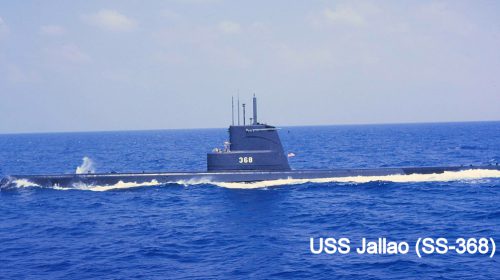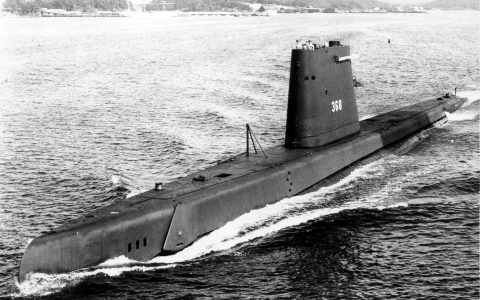|
|
USS Jallao SS-368Specifications and Mods |
|
As built, 1944
Class |
USS Balao (SS-285) |
Shipyard |
Manitowoc, Wisconsin (1943/1944) |
Displacement |
1526 tons (surfaced) 2424 tons (submerged) |
Length |
311.75 feet |
Beam |
27 feet |
Draft |
17 feet |
Torpedo Tubes |
Ten 21” tubes (6 bow, 4 stern) |
Machinery |
General Motors Diesel (4 with 1600 hp each) |
Surface Speed |
20 knots |
Submerged Speed |
10 knots |
Cruising Radius |
12,000 miles at 10 knots |
Complement |
80 men (8 officers, 72 crew) |
Operating Depth |
400 feet |
Electric Propulsion |
Two – 126 Cell Main Storage Batteries |
Armament |
5”/25 deck gun, Bofors 40 mm gun, 20 mm Oerlikon cannon |
Modifications
GUPPY IIA, 1953
The GUPPY IIA program (SCB 47C), implemented from 1952 to 1954. The GUPPY IIA, further alleviated the cramped internal conditions of earlier conversions by removing one forward engine and replacing it with pumps and air conditioning machinery. The high-pressure air compressors relocated to the lower level of the forward engine room. The freezer and refrigerator units were moved to the space under the galley, and the sonar room was relocated to the forward end of the pump room. Sargo II batteries were installed in the existing battery wells. The Sargo II was developed to be lower cost than the Guppy battery while providing most of the performance. It was intermediate in size between the Guppy and Sargo batteries. These batteries featured electrolyte agitation, battery cooling, and open tank ventilation. They also had a longer life than the Guppy batteries, though shorter than the original Sargo battery.
In the maneuvering room, two or four of the earlier high-speed motors and reduction gears were replaced by slow-speed motors. All open-front switchboards were replaced with enclosed splash-proof cabinets. Lighting and other “hotel” electrical loads were converted to use 120 volt 60 hertz alternating current, and ship electronics to use 120 volt 400 hertz AC. A new air conditioning system of greatly increased capacity was also installed.
Deck guns and their associated containers were removed. An SV radar aerial was added to the top of the sail, creating a distinctive side bulge. All capstans, cleats, and rail stanchion supports were redesigned so they could be retracted or removed when rigged for dive. Most notably, the sharp V-shaped “fleet boat bow” was replaced with a distinctive rounded “Guppy bow” that improved submerged performance.
Externally, the GUPPY IIA differed from the GUPPY II and IA by having only three diesel exhaust outlets, whereas the earlier conversions had four.
These modifications changed not only the boats’ appearance, but also terminology: After a GUPPY conversion, the faired structure around the boat’s conning tower and mast supports was called the “sail”.






